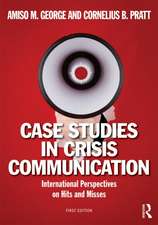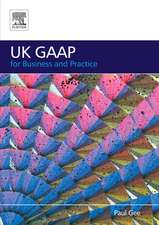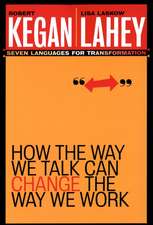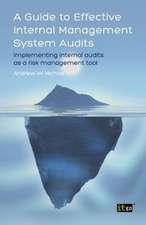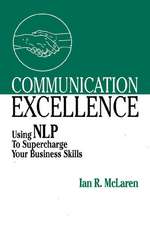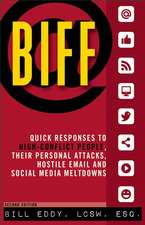International Financial Reporting Standards: A Framework-Based Perspective
Autor Greg F. Burton, Eva K. Jermakowiczen Limba Engleză Hardback – 27 feb 2015
- A clear presentation of the concepts underlying IFRS
- A conceptual framework to guide students in interpreting and applying IFRS rules
- A comparison between IFRS and US GAAP to develop students’ understanding of the requirements of each standard
- Real world examples and case studies to link accounting theory to practice, while also exposing students to different interpretations and applications of IFRS
- End of chapter material covering other aspects of financial reporting, including international auditing standards, international ethics standards, and corporate governance and enforcement, as well as emerging topics, such as integrated accounting, sustainability and social responsibility accounting and new forms of financial reporting
| Toate formatele și edițiile | Preț | Express |
|---|---|---|
| Paperback (1) | 926.08 lei 6-8 săpt. | |
| Taylor & Francis – 6 mar 2015 | 926.08 lei 6-8 săpt. | |
| Hardback (1) | 2784.67 lei 6-8 săpt. | |
| Taylor & Francis – 27 feb 2015 | 2784.67 lei 6-8 săpt. |
Preț: 2784.67 lei
Preț vechi: 3395.94 lei
-18% Nou
Puncte Express: 4177
Preț estimativ în valută:
532.92€ • 554.32$ • 439.95£
532.92€ • 554.32$ • 439.95£
Carte tipărită la comandă
Livrare economică 14-28 aprilie
Preluare comenzi: 021 569.72.76
Specificații
ISBN-13: 9780415827621
ISBN-10: 0415827620
Pagini: 842
Ilustrații: 645 b/w images, 215 tables and 430 line drawings
Dimensiuni: 178 x 254 x 52 mm
Greutate: 1.66 kg
Ediția:New.
Editura: Taylor & Francis
Colecția Routledge
Locul publicării:Oxford, United Kingdom
ISBN-10: 0415827620
Pagini: 842
Ilustrații: 645 b/w images, 215 tables and 430 line drawings
Dimensiuni: 178 x 254 x 52 mm
Greutate: 1.66 kg
Ediția:New.
Editura: Taylor & Francis
Colecția Routledge
Locul publicării:Oxford, United Kingdom
Public țintă
Postgraduate and UndergraduateCuprins
Part I: Conceptual Framework 1. Introduction to International Financial Reporting Standards (IFRS) 2. Conceptual Framework for Financial Reporting 3. Fair Value Measurement Part II: Presentation 4. Presentation of Financial Statements 5. Statement of Cash Flows 6. Accounting Policies, Estimates, and Errors 7. Events After the Reporting Period 8. Related Party Disclosures 9. Earnings per Share 10. Operating Segments Part III: Elements 11. Inventories 12. Financial Instruments – Recognition and Measurement 13. Financial Instruments – Presentation 14. Financial Instruments – Disclosures 15. Property, Plant, and Equipment 16. Intangible Assets 17. Investment Property 18. Impairment of Assets 19. Leases 20. Revenue 21. Income Taxes 22. Employee Benefits 23. Share-based Payments 24. Provisions, Contingent Liabilities, and Contingent Assets 25. The Effects of Changes in Foreign Exchange Rates 26. Hyperinflation Part IV: Reporting Entities 27. Business Combinations 28. Consolidated Financial Statements 29. Investments in Associates and Joint Ventures 30. Joint Arrangements 31. Disclosure of Interests in Other Entities 32. Separate Financial Statements Part V: Other Topics 33. Interim Financial Reporting 34. Non-current Assets Held for Sale and Discontinued Operations 35. Construction Contracts 36. Borrowing Costs 37. Accounting and Reporting by Retirement Benefit Plans 38. Accounting for Government Grants and Disclosure of Government Assistance 39. Insurance Contracts 40. Exploration for and Evaluation of Mineral Resources 41. Agriculture 42. First-time Adoption of International Financial Reporting Standards
Notă biografică
Greg Burton is the Deloitte & Touche Fellow and Professor of Accounting at Brigham Young University, USA. He served as the Academic Fellow in the Division of Corporate Finance with the SEC in 2008-2009, where he was involved with all IFRS filings and projects. He teaches auditing, financial accounting, and international accounting.
Eva Jermakowicz is a Professor of Accounting and Chair of the Accounting and Business Law department at Tennessee State University, USA. A former Fulbright scholar, she has extensive teaching and professional experience in accounting and financial reporting.
Eva Jermakowicz is a Professor of Accounting and Chair of the Accounting and Business Law department at Tennessee State University, USA. A former Fulbright scholar, she has extensive teaching and professional experience in accounting and financial reporting.
Recenzii
"Accounting standard setters are being challenged by the need to promulgate rules for reporting business transactions, events, and contracts in a world of ever-growing interconnectedness and complexity. The International Accounting Standards Board has addressed this challenge by expanding the scope and coverage of IFRS to the extent that they now rival U. S. GAAP. In this book, Professors Burton and Jermakowicz lucidly describe IFRS in a presentation appropriately founded upon a conceptual framework. In each chapter, the authors set forth the learning objectives, summarize the pertinent concepts and principles, and conclude by explaining the applicable rules. Cogently linking concepts with rules of practice, this book should prove very useful to students in paving the way toward a clear understanding of IFRS." - A. Rashad Abdel-khalik, Professor, University of Illinois, USA
"In this effective introduction to IFRS, the authors wisely approach each topic by first looking at the concepts underlying the related IFRS, and then use those concepts to demonstrate the specifics. IFRS today is about 4,000 pages, making it almost impossible to learn all the rules, but Greg Burton and Eva Jermakowicz's concept-based book offers a better approach to learning." - Paul Pacter, Former Board Member, International Accounting Standards Board
"While students may like learning specific rules, professional accountants and auditors must be able to think critically and analyze issues. This principles-based book will undoubtedly help them do that. Greg Burton and Eva Jermakowicz have combined broad topical coverage with useful pedagogy to encourage a wide range of learning, from understanding the foundations, to critical thinking and analysis, to enhancing important communication skills with writing assignments. With its modular setup, real-world examples, links to authoritative literature, and comparison of IFRS and US GAAP, this book will prove indispensible to both instructors and practitioners as a teaching resource and a reference." - Teresa Conover, Paden Neeley Professor, University of North Texas, USA
"In this effective introduction to IFRS, the authors wisely approach each topic by first looking at the concepts underlying the related IFRS, and then use those concepts to demonstrate the specifics. IFRS today is about 4,000 pages, making it almost impossible to learn all the rules, but Greg Burton and Eva Jermakowicz's concept-based book offers a better approach to learning." - Paul Pacter, Former Board Member, International Accounting Standards Board
"While students may like learning specific rules, professional accountants and auditors must be able to think critically and analyze issues. This principles-based book will undoubtedly help them do that. Greg Burton and Eva Jermakowicz have combined broad topical coverage with useful pedagogy to encourage a wide range of learning, from understanding the foundations, to critical thinking and analysis, to enhancing important communication skills with writing assignments. With its modular setup, real-world examples, links to authoritative literature, and comparison of IFRS and US GAAP, this book will prove indispensible to both instructors and practitioners as a teaching resource and a reference." - Teresa Conover, Paden Neeley Professor, University of North Texas, USA
Descriere
This book links broad concepts and accounting principles to the requirements of IFRS to help students develop the judgment needed in using a principle-based standard. It includes cases, real-world examples, and a website to link theory to practice.










